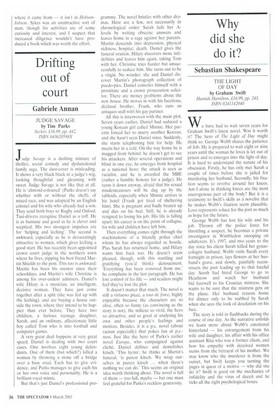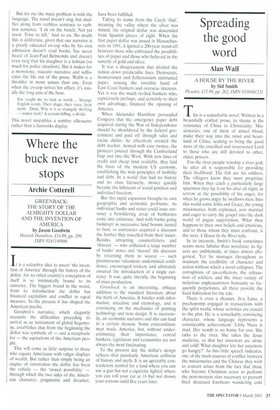Why did she do it?
Sebastian Shakespeare
THE LIGHT OF DAY by Graham Swift Hamish Hamilton, £16.99, pp. 243, ISBN 0241142040 We have had to wait seven years for Graham Swift's latest novel. Was it worth it? The hero of The Light of Day might think so. George Webb shares the patience of Job. He is prepared to wait eight or nine years until the woman he loves is let out of prison and re-emerges into the light of day. It is hard to understand the nature of his obsession. Firstly, he has only met Sarah a couple of times before she is jailed for murdering her husband. Secondly, his fixation seems to revolve around her knees. Am I alone in thinking knees are the most unerogenous part of the body? But it is a testimony to Swift's skills as a novelist that he makes Webb's fixation seem plausible. Love represents solace for the past as much as hope for the future.
George Webb has lost his wife and his job. Thrown off the police force for throttling a suspect, he becomes a private investigator in Wimbledon snooping on adulterers. It's 1997, and two years to the day since his client Sarah killed her gynaecologist husband. Webb visits Sarah every fortnight in prison, lays flowers at her husband's grave, and slowly, painfully reconstructs the past leading up to that fateful day. Sarah had hired George to go to Heathrow and watch her husband bid farewell to his Croatian mistress. She wants to be sure that the mistress gets on the plane. Her husband returns home for dinner only to be stabbed by Sarah when she sees the look of desolation on his face.
The story is told in flashbacks during the course of one day. As the narrative unfolds we learn more about Webb's emotional hinterland — his estrangement from his wife and daughter, his affair with his office assistant Rita who was a former client, and how his empathy with deceived women stems from the betrayal of his mother. We may know who the murderer is from the outset, but Swift keeps you turning the pages in quest of a motive — why did she do it? Swift is good on the mechanics of infidelity and the virus of deceit and he ticks all the right psychological boxes.
But for me the main problem is with the language. The novel doesn't sing, but shuffles along from verbless sentence to verbless sentence. 'I sit on the bench. Not yet noon. Time to kill.' And so on. No doubt this is deliberate, given that our narrator is a poorly educated ex-cop who by his own admission doesn't read books, has never heard of Jean-Paul Belmondo and doesn't even twig that his daughter is a lesbian (so much for police intuition). But it makes for a monotone, staccato narrative and suffocates the life out of the prose. Webb is a throttler in more senses than one. Even when the ex-cop strives for effect, it's usually the long arm of the bore.
She taught me to look at words ... Strange English words, Their shape, their trace, their scent. Dusk. Why is it so strangely thrilling — winter dusk? A curtain falling, a divide.
This novel resembles a sombre silhouette rather than a fireworks display.



































































 Previous page
Previous page